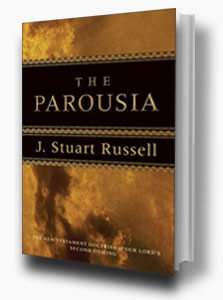- Table of Contents
- About the Author
- Preface to the Book
- The Last Words in Old Testament Prophecy
- PART I. - The Parousia in the Gospels
- Parousia in the Synoptical Gospels
- Prophetic Intimations of the approaching Consummation of the Kingdom of God:
- The Prophecy on the Mount examined:
- Our Lord's declaration before the High Priest
- Prediction of the Woes coming on Jerusalem
- Prayer of the Penitent Thief
- Apostolic Commission, the
- The Parousia in the Gospel of St.John.
- Appendix to Part I
- PART II. The Parousia in the Acts and the Epistles.
- In the Acts of the Apostles.
- In the First Epistle to the Thessalonians
- In the Second Epistle to the Thessalonians
- In the First Epistle to the Corinthians
- In the Second Epistle to the Corinthians
- In the Epistle to the Galatians
- In the Epistle to the Romans
- In the Epistle to the Colossians
- In the First Epistle to Timothy
- In the Second Epistle of Timothy
- In the Epistle to Titus
- In the Epistle to the Hebrews
- In the Epistle of St. James
- In the First Epistle of St. Peter
- In the Second Epistle of St. Peter
- In the First Epistle of St. John
- In the Epistle of St. Jude
- Appendix to Part II
- Part III. The Parousia in the Apocalypse.
- Summary and Conclusion
- Appendix to Part III.
- Afterword by Russell
- All the Comparative Scripture Charts Combined
THE PAROUSIA
by James Stuart Russell
THE PAROUSIA IN THE EPISTLE TO TITUS.
ANTICIPATION OF THE PAROUSIA.
Titus 2:13—‘Looking for that blessed hope, and the revelation of the glory of the great God, and our Saviour Jesus Christ.’
We again find here, what we have long come to recognise, the habitual attitude of the Christians of the apostolic age, the expectation of the Lord’s coming. It is inculcated as one of the primary Christian duties, and ranks with sober, righteous, and godly living. This implies that the event was regarded as at hand, for how could a powerful motive to watchfulness be derived from a remote and unknown contingency lying in the distant future? Or, how could it be the duty of Christians to be ‘looking’ for that which was not to happen for hundreds and thousands of years? The apostle evidently regards the present aeon, ton nun aiwna, as drawing to a close, and exhorts Christians to live in the attitude of expectancy of the Parousia, which was to introduce the new order, ‘the aiwn o mellwn.’








Comments